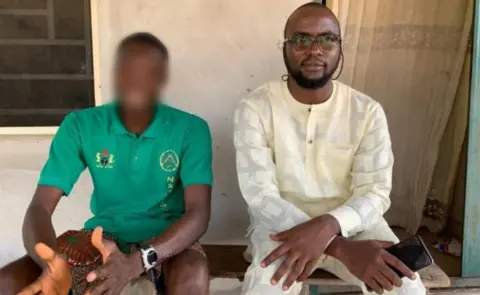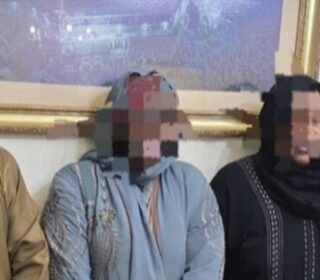
Activist Leo Igwe is at the forefront of efforts to help people accused of witchcraft in Nigeria, as it can destroy their lives – and even lead to them being lynched.
“I could no longer take it. You know, just staying around and seeing people being killed randomly,” Dr Igwe tells the BBC.
After completing his doctorate in religious studies in 2017 he was restless. He had written extensively about witchcraft and was frustrated that academia did not allow him to challenge the practice head on.
The BBC has seen evidence of Pentecostal pastors in Nigeria holding services targeting alleged witches, a practice Dr Igwe says is not unusual in a country where many people believe in the supernatural.
Warning: This article contains details some readers may find disturbing.
So Dr Igwe set up Advocacy For Alleged Witches, an organisation focussed on “using compassion, reason, and science to save lives of those affected by superstition”.
Dr Igwe’s prevention work also extends to Ghana, Kenya, Malawi and Zimbabwe and beyond.
One of the people the organisation has helped in Nigeria is 33-year-old Jude. In August, it intervened when he was accused and beaten in Benue State.
Jude, a glazier, who also works part-time in a bank, says he was on his way to work one morning, when he met a boy carrying two heavy jars of water which prompted him to comment on the boy’s physical agility.
The boy did not take the comments kindly, but he went on his way.
Later, Jude was followed by a mob of about 15 people throwing stones at him. Among them was the boy he had greeted earlier.
“Young men started fighting me as well, trying to set me ablaze,” Jude says.
He was accused of causing the disappearance of the boy’s penis through witchcraft, an accusation that shocked him and is untrue.
Claims of manhood disappearances are not uncommon in some parts of West Africa.
It is a claim that has been linked to Koro syndrome, a mental illness otherwise known as missing or genital retraction hysteria.
It is a psychiatric disorder characterised by an intense and irrational fear of the genital organs going missing or retracting into the body of the victim.
Dr Igwe says Jude lost his job at the bank because of the stigma surrounding the accusation.
A video of the violent witch-hunting altercation also began to circulate on Facebook, which is when Dr Igwe and his team noticed and began to investigate.
“They brought him [Jude] out naked, you know, brutalised,” Dr Igwe says. “We first of all localise it – where is this taking place?”

On WhatsApp, Dr Igwe is something of an influencer.
Over the last few years he has built and curated WhatsApp groups for different Nigerian states.
These groups are full of dozens of concerned citizens who he dubs “advocates”. They share viral witch-accusation videos and photos and try to intervene when an allegation is being made on their patch.
“We reached out to him [Jude]. We sent him some money to take care of his wounds. We socially rehabilitate him,” Dr Igwe says.
Advocacy for Alleged Witches also wrote to the bank to try to prevent Jude from getting the sack, although they did not hear anything back, he says.
The group has also committed to paying Jude’s university fees, which it hopes can provide him with a fresh start.
Many in Africa’s most-populous country believe in, and live in fear of, witches and the diabolical powers they supposedly wield.
Financial problems, diseases or infertility are often blamed on witchcraft.
Those accused are often vulnerable. Most of the time they are either very young or very old, sometimes they have mental or physical disabilities and often they live in poverty.

















